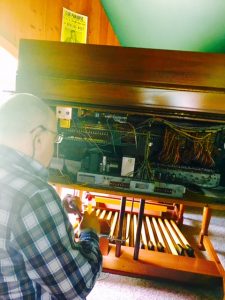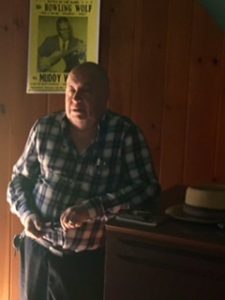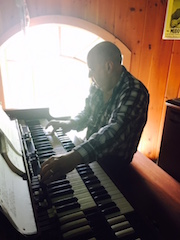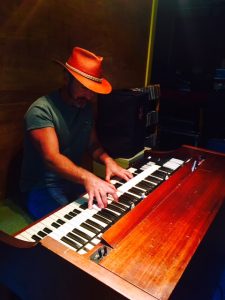
These days I find myself not taking the rare treasures in life for granted. I drink only handcrafted small-batch gin; I’ve been gradually removing all paperbacks from my study and replacing with out-of-print rare books (like my well-oiled leather-bound Edgar Allen Poe first editions). Additionally, I now cancel my day’s business when I know that Keith Clark is going on the road, headed my way on the back roads of rural New England, to service my 1969 vintage Hammond B3. Watching him open up my beloved instrument (and Leslie speaker cabinet) and doing what he does as he tells stories about the organs of old — and how he keeps them running — is a kind of a galactic, time travel experience.
Doc Clark — I call him Doc not just because of his surgeon-like skill inside the tubes and capacitors and snake-nest circuitry of the organ, but he also holds an honorary doctorate from the Cleveland Institute of Electronics from which he graduated after passing up a chance at appearing on the Lawrence Welk Show (playing and promoting the Thomas organ). An accomplished organist, he studied music under the likes of Frank Heffer and Ralph Woodworth Jr. Today, he might be the last true traveling organ repairman in America. I say ‘true’ because while there are other technicians doing house calls, Keith logs on more miles than a freight trucker, traveling in his 2001 Saab Aero across Vermont, New Hampshire, Maine, and Eastern New York.

Hammond B3’s, first manufactured in 1955, are no longer produced — so whatever original parts have been preserved, well, they are the last of them. “When they’re gone,” says Keith, “they’re gone.” Yet, he had the foresight to gather and store these rare parts long ago, and sometimes he manufactures his own at an industrial park, creating parts like they used to be. Even the oil tube he uses to lubricate my Hammond is a collector’s item (the long ones that can get into the nooks and crannies of the organ) and if you squeeze it too hard the plastic will crack. But Keith still uses it because nothing since does the job so well.
And that’s what seems to drive Keith Clark from state-to-state and client to client, whether country church or rock-and-roller like Grace Potter (Keith knew her way back when and has maintained her Hammond in the past; Grace speaks in glowing terms about him and his skills). “Keeping the old beasties running,” is the mission he says. Then he thinks about it a bit more as he kneels at the open back of the nearly 50 year-old B3, oiling and checking tubes. “Really, what I like best about this is that I get to keep these organs running the way they were originally and the way no one remembers. They don’t know how good it was.”
 (Pic Right: Grace Potter at her Hammond B3)
(Pic Right: Grace Potter at her Hammond B3)
In addition to the prestigious Cleveland Institute, Keith Clark has attended service schools for most manufacturers through the years and is certified with Roland, Hammond (original) and others. He also has the creative and clever mind of an inventor; he’s designed and produces the unique ISI Controls, Leslie speed controls, and other products.
These days Keith has found himself staying on the road no matter the challenges. Diabetic retinopathy could have stopped him, but did not. A cataract in his main eye almost put him down for the count, but doctors removed it and he has kept on. Currently, Doc Clark is being forced from his rented workshop in a West Burke, Vermont historic building, and looking for a space to store those rare parts and continue his work on organs and speakers. He’s hoping to maybe build onto his home, having his own workshop right there, instead of a rent.

Today, while Keith replaces some parts inside my Leslie speaker cabinet he tells me the story behind the “Born to be Wild” organ sound from Steppenwolf. It was due to a blown speaker in the Leslie cabinet. Man oh Mannish-Boy, is that true? Yes says Keith: It was a flaw that created the overdriven heated B3 sound that everyone has since wanted to replicate. Lost organ lore like that always adds to Keith’s service calls — he’s been servicing my ’69 Hammond for 16 years. It runs and sounds better than ever and it’s always a fascinating experience to watch him work on it; he knows it inside and out, kind of like when my vet tends to a beloved horse over the years. But when he holds down a full-bodied chord and pulls the drawbars to test the sound, there’s often an elegiac tone to it, like a minor blues about time passing us by. But that might be my writer’s imagination. Truth is, I know that the day Doc Clark stops traveling, the last of a breed will be gone and a lot of organists will fully realize what they had. Because as long as Keith Clark is working on these ‘beasties’ he keeps this vintage sound alive and well.
 (John Fusco at a vintage Hammond A100)
(John Fusco at a vintage Hammond A100)
(Keith Clark owns and operates Premium Elite Service in West Burke, VT. 802-467-1042. organtec@charter.net)









